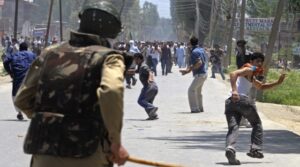Human Rights Challenges in Indian Illegally Occupied Jammu and Kashmir: A Call for Dignity, Freedom, and Justice
As the world marks International Human Rights Day under the theme “Dignity, Freedom, and Justice for All,” it is critical to turn our attention to the long-standing human rights challenges in Indian Illegally Occupied Jammu and Kashmir.
The history of Jammu and Kashmir is intertwined with complex geopolitics and territorial disputes. The region has been embroiled in a long-standing conflict between India and Pakistan, with India Illegaly Occupying a big chunk of this region. Unfortunately, the local population has become a victim of Indian brutalities, leading to numerous violations of human rights.
The presence of armed forces in Indian Illegally Occupied Jammu and Kashmir has led to numerous violations of human rights. These include the excessive use of force by security personnel, the plight of half-widows, the separation of families, arbitrary detentions, disappearances, and restrictions on freedom of speech. The impact of armed conflict on civilians, especially women, and children, further emphasizes the need to address these issues.
Indian Illegally Occupied Jammu and Kashmir is known for having one of the highest military-to-civilian ratios i.e. 9:1, in the world, making it a densely militarized zone. The Indian Government’s decision to abrogate Articles 370 and 35A opened the door to severe human rights violations in IIOJK. This move has deprived the people of the region of their basic right to self-determination and the ability to choose their future through a plebiscite, which was suggested by the United Nations. Several international human rights reports document the frequent violations occurring in IIOJK almost every month.
The Amnesty report underscores the drastically intensified repression in the region, pointing to violations of Article 3 (right to life, liberty, and security of person), Article 9 (arbitrary arrest, detention, or exile), Article 19 (freedom of opinion and expression), Article 21 (right to participate in government), Article 10 (right to a fair and public hearing), and Article 12 (no arbitrary interference with privacy).
The international community recognizes the importance of upholding human rights standards in areas affected by conflict. The Indian government has committed to complying with various international agreements and treaties that safeguard basic human rights. In the interest of promoting peace and stability, it is necessary to assess the adherence to these standards when examining the situation in Kashmir and taking appropriate measures to address any violations that may have occurred.
To gain a comprehensive understanding of the impact of the conflict, it is imperative to take into account the perspectives of Kashmiri civilians. The personal experiences of individuals, families, and human rights activists on the ground provide valuable insights into the challenges they face daily. These narratives underscore the urgency of addressing the human rights situation in IIOJK.
In light of increasing concerns, numerous esteemed international organizations, including Amnesty International, have called for impartial investigations into alleged human rights violations. The pursuit of justice for victims is an essential component of the road to lasting peace. By acknowledging these calls and collaborating with international bodies, a resolute commitment to upholding human rights principles can be demonstrated.
To achieve progress, it is essential to adopt a comprehensive and inclusive approach. Dialogue and cooperation between all stakeholders, including the affected communities i.e. the Kashmiris, are crucial for building trust and finding sustainable solutions. The international community can play a positive role in facilitating talks between India and Pakistan and encouraging a peaceful resolution that upholds the principles of dignity, freedom, and justice for all.
As we observe International Human Rights Day, we acknowledge the situation in IIOJK as a reminder of the persistent challenges faced by people living in conflict zones. By recognizing the historical context, comprehending the human rights violations, and encouraging open dialogue, we can work towards a future where the values of dignity, freedom, and justice are upheld for all, fostering a world where no one is left behind. It is our shared responsibility to advocate for a peaceful and equitable resolution to the Kashmir conflict, ensuring a brighter and more secure future for the region and its inhabitants.
About Writer
The Writer Aleena Zafar is a Research Officer at YFK-International Kashmir Lobby Group
- Kashmir Martyrs day - July 24, 2024
- Heroic Hearts: Remembering Kashmir’s Martyr - July 24, 2024
- Burhan Wani: The Icon of Kashmir’s Resistance - July 11, 2024








